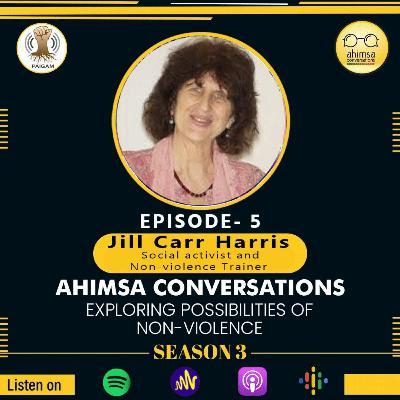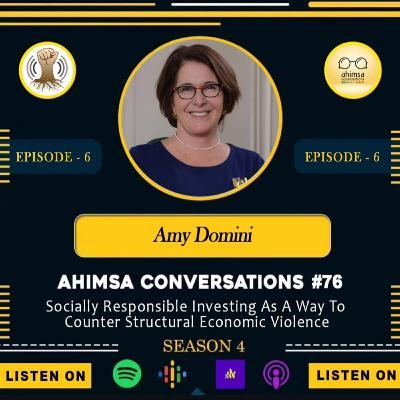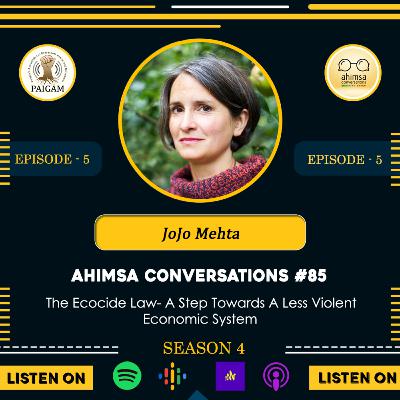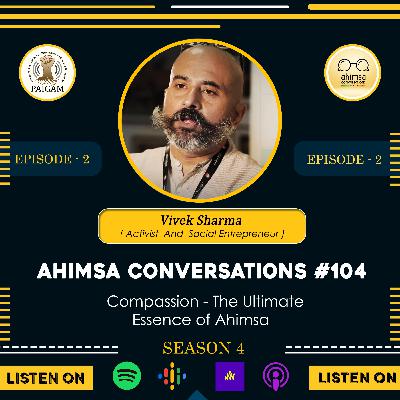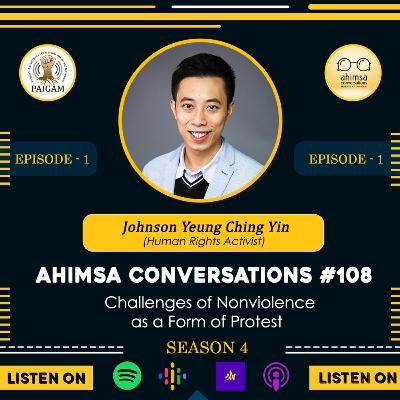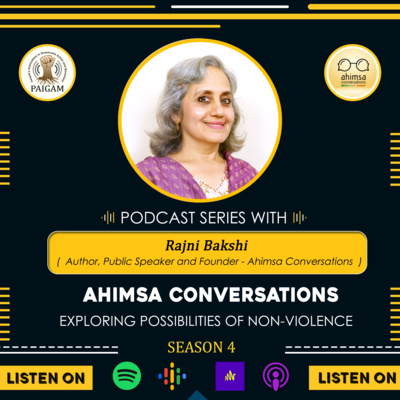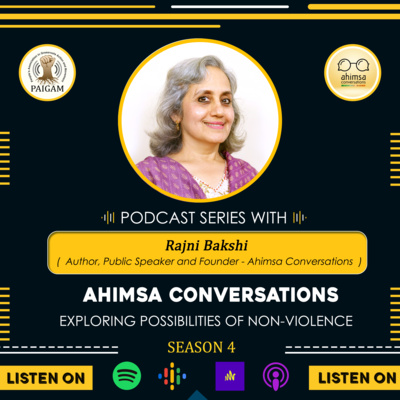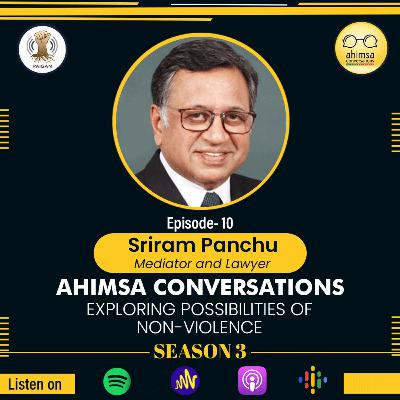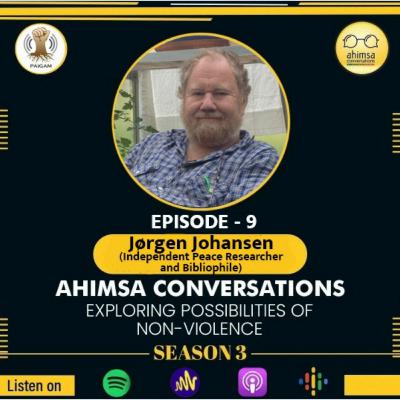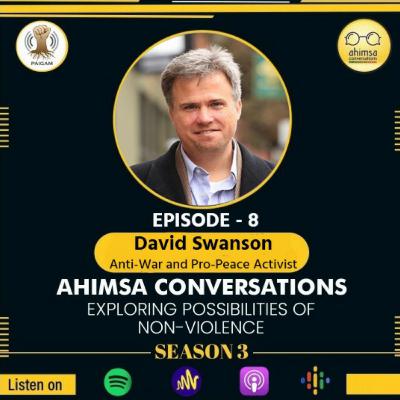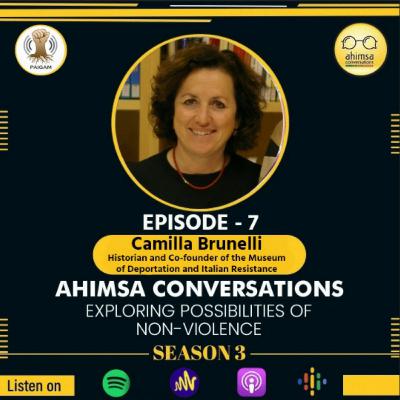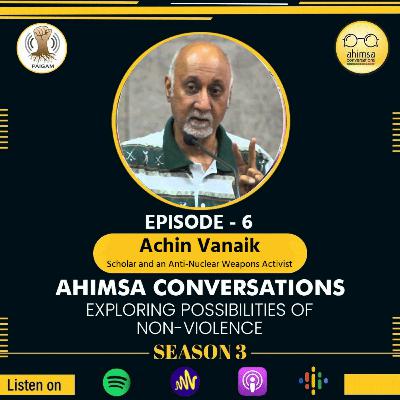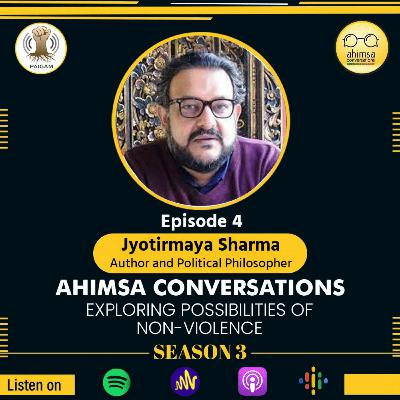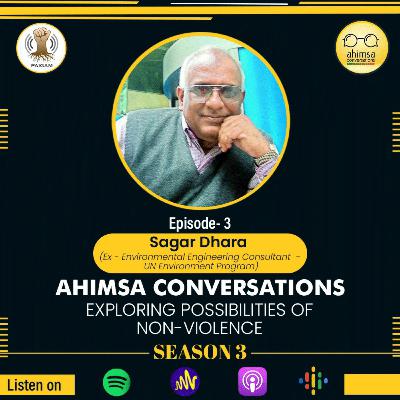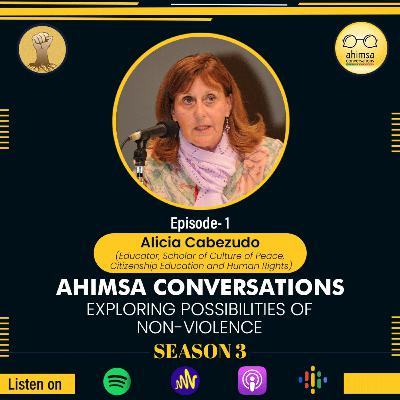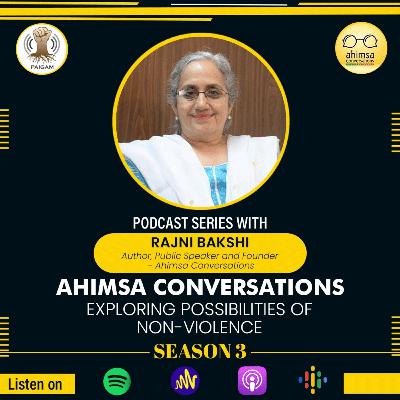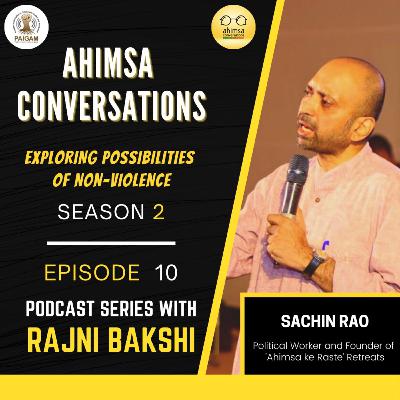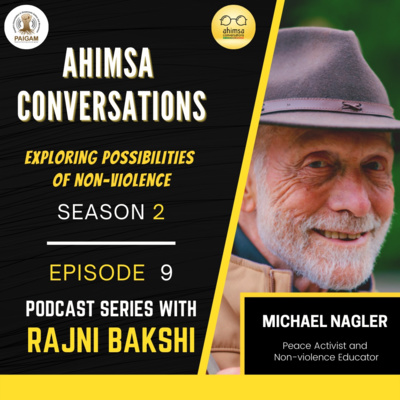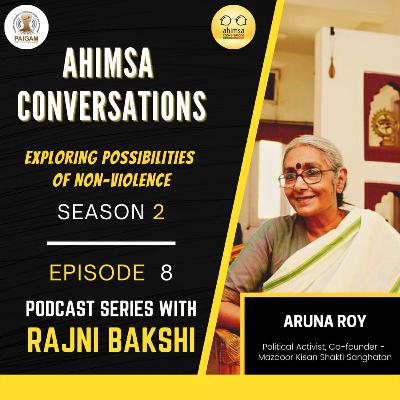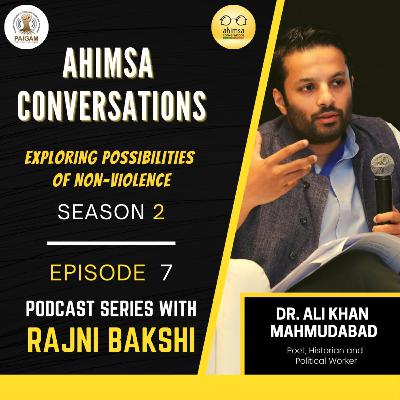Discover Ahimsa Conversations
Ahimsa Conversations

Ahimsa Conversations
Author: Ahimsa Conversations
Subscribed: 4Played: 13Subscribe
Share
© Ahimsa Conversations
Description
Ahimsa Conversations is a platform for reflections on the possibility of nonviolence and the nature of violence.
Our candid discussions include voices of those whose experience in varied fields throws light on how nonviolence is actionable and effective, by ordinary people, firstly as a way of life and as a method of political action. Executed by PAIGAM.
Podcast series supported by Rohini Nilekani Philanthropies.
Our candid discussions include voices of those whose experience in varied fields throws light on how nonviolence is actionable and effective, by ordinary people, firstly as a way of life and as a method of political action. Executed by PAIGAM.
Podcast series supported by Rohini Nilekani Philanthropies.
43 Episodes
Reverse
क्या संघर्ष को पूर्वक्रया करना संभव है?
Non-violence trainer Jill Carr Harris believes that this is indeed sometimes possible if you bring your non- reactive self to the fore.
In Ep 5, she talks about her work with village women struggling for their land rights in India with a non-violence frame.
Socially Responsible Investing (SRI) has been one of the creative and constructive attempts to counter the structural violence of the economic system, over the last three decades. In Episode 6, Amy Domini, who is known as the ‘Founding Mom of SRI’ in the USA, speaks about how her parents’ experiences and political views made aversion to violence a key element of her childhood. She describes how and why she became one of the pioneers of SRI at a time when there were neither social-environmental rules nor checks and balances on investors. The rise of investors and consumers who are committed to ‘Buying Better’ has both reduced their complicity in the economic violence caused by companies as well as raised awareness about people and planet impacts of production systems. Here Amy speaks candidly about minor successes in the sphere of curbing gun sales and how that remains an uphill task in the USA. She remains hopeful about efforts to foster nonviolent, or less violent, economic systems.
Making ecocide, the murder of nature, a recognised crime would be one step towards a less violent economic system. Jojo Mehta is an environmental campaigner and the co-founder of Stop Ecocide - a campaign that is generating international momentum to establish ecocide as a crime at the International Criminal Court. In Ep 5 of Ahimsa Conversations Podcast Season 4, Jojo explains the reasoning behind this campaign and how its success would be one way of countering the violence of production systems.
Growing up during a period of violence can foster the quest for nonviolence. Social activist and entrepreneur, Vivek Sharma grew up during the times of violent militancy in Punjab. In Episode 2 of Ahimsa Conversations Podcast, he explains how this shaped his quest for ahimsa as an effort in which he has not yet succeeded but which has enriched his life's journey.
Vivek is the founder-director of Gandhi fellowship program and is committed to training young people in compassionate processes.
Standing up for someone who was being hurt was an empowering experience, even when Johnson Yeung Ching Yin was himself a child. As a university student he became one of the leaders of Hong King's pro democracy Umbrella Movement in 2014. In Episode 1 of the Ahimsa Conversations Podcast, he talks about the challenges of practicing a pure non-violence and highlights the importance of not seeing non-violence in absolute terms. He also talks about his friends in Ukraine and Russia who are opposing the war, many putting their life on the front line, in an effort to reduce the combatants' will to fight.
Welcome to season 4!
Intro in English.
Welcome to season 4!
Intro in HINDI.
मध्यस्थता उन तरीकों से संघर्षों को हल कर सकती है जो दोनों पक्षों को उचित और न्यायपूर्ण लगता है|
In the final episode of Ahimsa Conversations Podcast S3, Sriram Panchu, an internationally renowned mediator and lawyer, speaks about how mediation can work in diverse situations – be it a father-son property dispute or a quarrel over a place of worship. As one of the three mediators appointed by the Supreme Court of India, to address the Ayodhya Babri Masjid Ram Janambhumi dispute, Sriram explains how one can seek the ‘harmonizing middle’ even in the most trying circumstances.
Jørgen Johansen was 18 years old when he was sent to prison for refusing to become a soldier.
In Episode 9 of Ahimsa Conversations Podcast S3, Jørgen describes a life-long engagement with peace activism. Speaking about the conflict in Ukraine, Jørgen says that instead of boycotts what is now needed are 'girlcotts', a term which he has coined, which in this case means reaching out to the best voices inside Russian society - those who dare to stand up against the war.
In Ep 8 of Ahimsa Conversations Podcast S3, David Swanson, co-founder of the network World Beyond War, draws attention towards attention towards the conflict in Ukraine where people are kneeling or standing before tanks, feeding soldiers and having them call their mothers to say they're coming home. He further unravels the lies that accompany wars.
Knowing and documenting the horrific consequences of violence is one way of honouring its victims and preventing violence in future. In Episode 7 of Ahimsa Conversations Podcast we have Camilla Brunelli, who works on European memory culture and has learnt this first hand from Italian victims of Nazi concentration camps and slave-labour camps.
सामूहिक विनाश के हथियारों को खारिज करना केवल अस्तित्व की वृत्ति की अभिव्यक्ति नहीं है - यह एक नैतिक मुद्दा है
Listen to Achin Vanaik, an anti-nuclear weapons activist, talk about why opposition to nuclear weapons is not usually considered a part of non-violence movements in Ep 6 of Ahimsa Conversations Podcast
क्या गांधी ने अहिंसा को धर्म में बदलकर इस आदर्श को मायावी बना दिया?
In Ep 4 of Ahimsa Conversations Podcast S3, Jyotirmaya Sharma reflects on this question based on his extensive study of nationalism, particularly Hindu nationalism and his new book 'Elusive Nonviolence : The Making and Unmaking of Gandhi's Religion of Ahimsa'
क्या केवल मनुष्यों के संबंध में अहिंसा के बारे में सोचना एक घातक दोष है?
In Ep 3 of Ahimsa Conversations Podcast Season 3, Sagar Dhara, an environmental engineer and activist explains how carbon theft by human societies has led to a steady build up of violence. This conversation was recorded soon after Sagar returned from the COP26 gathering in Glasgow. He explains why the current rate of action is insufficient to avoid catastrophic climate chaos.
क्या हिंसक खिलौने हमें हिंसा की संस्कृति की ओर ले जाते हैं?
Season 3, Ep 1 of Ahimsa Conversations Podcast will see educator and scholar of peace studies, Alicia Cabezudo talk about how violent toys can be detrimental for children and society at large!
.
Sachin Rao says it’s a wide spread curiosity about the linkages between Swaraj, Truth and Nonviolence. A former engineer and business consultant, Sachin is now a full-time worker of a major political party, the Indian National Congress. Since 2018, Rao has organized 25 Ahimsa ke Raste (Paths of Nonviolence) camps which are attended by a wide range of party workers and others who are keen to explore the possibilities of a politics based on nonviolence. That is, says Sachin, a politics based on creating win-win situations rather than defeating or oppressing some ‘other’.
In the exhaustive media coverage of the United States’ Presidential election, the American Shanti Sena (Peace Army) network hardly got a mention. That is because violence prevention is generally under-reported. Michael Nagler, veteran peace activist and educator, talks about what energizes grassroots efforts that make peace by de-escalating tensions and preventing violence. From the legacy of his guru Sri Eknath Easwaran to the work of groups like Nonviolent Peaceforce, Michael explains how a new story of human nature is taking shape and why nonviolence is the natural destiny of our species. He also talks about his documentary ‘The Third Harmony: Nonviolence and the New Story of Human Nature’.
Aruna Roy learnt early in life that anger and violence can be quite different. As a political activist she has applied this learning to her work in Mazdoor Kisan Shakti Sangathan (MKSS) and in the Right to Information movement – leading campaigns based on civil disobedience and nonviolence. MKSS, which completes 30 years today -- May 1st 2020, has played a key role in the struggle to deepen democracy both at the village and national level in India. But today Roy is concerned that both society and government are giving the signal that it is okay to harm some kinds of people. When such a division is created the whole society is in danger of being destroyed. In this context, says Roy, the practice of nonviolence becomes even more vital. This requires greater resilience, courage and confidence in your principles. Only then can you demand justice by standing unarmed, before a heavily armed police force, knowing that you could be beaten or even killed. Roy’s life and work have shown this to be true.
Violence is a natural human tendency and that is why all religions guide us on how to overcome our base self, says Ali Khan, historian, poet and political worker in Ep 7 of Ahimsa Conversations Podcast S2. There is no path directly from violence to nonviolence. Truth and reconciliation are possible if there is both acceptance of guilt and forgiveness. The energy for this can only come from samaj/society, not the State.


